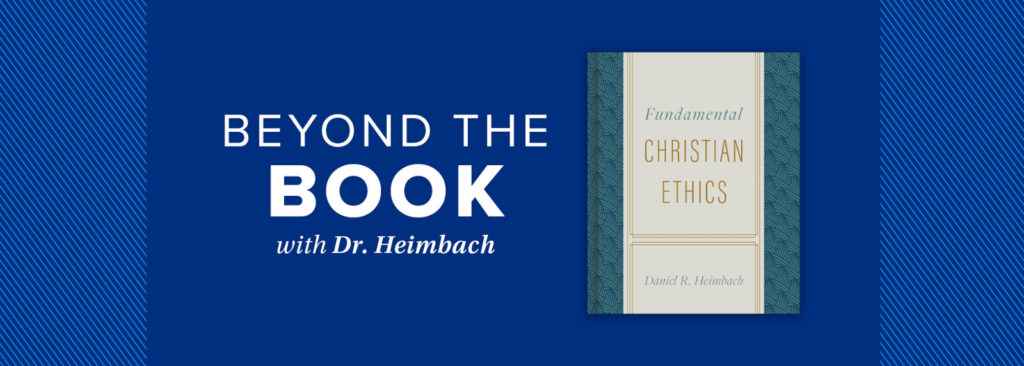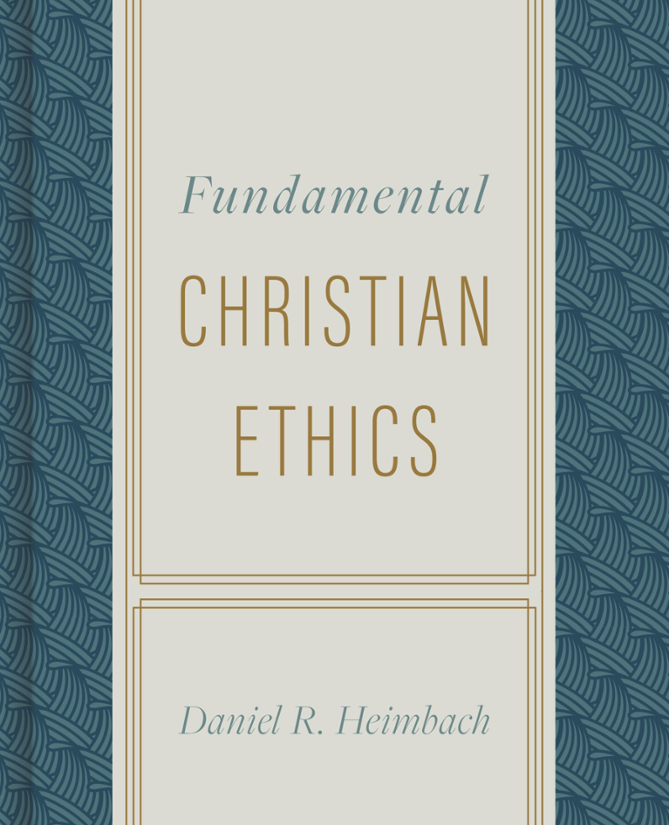Beyond the Book with Dr. Heimbach: “Fundamental Christian Ethics”
Chad Burchett | October 18, 2022

The study of Christian ethics is relevant to every aspect of life, informing, correcting, and shaping how we live before God wherever he sends us.
Christian ethics are essential to navigating not only profound moral, cultural, and political issues but also everyday moments replete with questions of how to live wisely before God. Providing guidance for navigating these issues and questions, “Fundamental Christian Ethics” surveys the discipline and offers a Christian metaethic while also providing extended treatments on various matters of ethical concern.
Written by Daniel Heimbach, Retired Senior Research Professor of Christian Ethics at Southeastern Baptist Theological Seminary, ”Fundamental Christian Ethics” offers a timely, formative, and enriching discussion of Christian ethics. In the following Q&A, Heimbach takes the time to answer a few questions about his new book:
What is the book about?
“Fundamental Christian Ethics” is written to resource Christians as they engage our culture and the world in moral witness at a time when most are “suppressing the truth” (Rom 1:18) and substituting “darkness for light and light for darkness” (Isa 5:20).
Who is the target audience, and how do they hope you will benefit from the book?
This is first of all a textbook for courses preparing Christian scholars, teachers, and ministers to understand and apply God’s norms, cultivate and inspire godly character, and interpret and teach God’s ethical reality. However, it is written not just for scholars but also for general readers simply wanting to understand what God requires and why and how the world thinks and why. It is academically rigorous yet written so any adult can apprehend and use what it offers.
What motivated you to write the book?
We live in days when ethical truth and framing ethical thought are critical challenges. These have been contested since Adam and Eve. The intensity of ethical conflict rises and falls, and we live in days when hostility toward God’s reality is rising and differences are getting very obvious.
We live in days when ethical truth and framing ethical thought are critical challenges.
What contemporary ethical concerns have you addressed in the book that you would not have included fifteen or twenty years ago? How have Christians been well- or ill-equipped to respond to these contemporary ethical challenges?
New issues challenging God’s moral reality are emerging every day. New issues addressed in “Fundamental Christian Ethics” that would not have been covered earlier include developments in biomedical ethics that not only challenge the sanctify of human life but also what it means to be human, transgenderism, same-sex marriage, terrorism, global warming, human trafficking, technology, and torture. “Fundamental Christian Ethics” also equips readers to address old issues some other introductions overlook such as prostitution, pornography, racism, slavery, gambling, drug abuse, religious liberty, cultural engagement on moral issues, and tensions that arise when Christians get involved in government and politics.
What are some of the ways that a robust Christian ethic should inform Christians’ responses to the U.S. Supreme Court decision to overturn Roe v. Wade on June 24, 2022?
On this I think asking “how to think” is more important than asking “what to do.” What Christians should do following the Supreme Court overturning Roe v. Wade is to continue doing what we have been doing. We must remain faithful to the word of God — and the word of God never changes — so in that sense “Fundamental Christian Ethics” offers nothing new. What “Fundamental Christian Ethics” offers that is of most value to moral witness on abortion concerns “how to think,” and this has two parts: understanding how abortion proponents think and argue and understanding how biblically faithful Christians ought to think and argue. The book covers this in depth. A key insight is that, to be effective, promoting the sanctity of human life ethic in regard to present (post Roe v. Wade) law and culture needs to shift from arguing on the basis of personhood to arguing on the basis of obligation to protect innocent human life. Not only is this more effective in public policy debate with non-Christians, it also is more faithful to how God presents the sanctity of life ethic in the Bible.
We must remain faithful to the word of God — and the word of God never changes.
How does your introduction to Christian ethics equip readers to serve the Church and fulfill the Great Commission?
Jesus begins the Great Commission by asserting total authority, including ethical authority over everything, not only in heaven but also on earth and not only spiritually but also materially (Matt 28:18). Jesus then concludes the Great Commission by sending us to teach “everything I have commanded you” (Matt 28:20), and this includes teaching God’s moral truth exactly as God proclaims it. Jesus is God in the Old Testament as well as in the New, so this requires teaching the way God reveals ethical truth throughout the Bible and not simply in the Gospels. Everything in “Fundamental Christian Ethics” equips readers to serve the Church and fulfill the Great Commission.
How has surveying and introducing the discipline of Christian ethics shaped you spiritually?
The object of Christian ethics is Jesus himself, and you cannot introduce others to someone you do not know yourself. The better you know a person the better introduction you can give. It took fourteen years for me to write “Fundamental Christian Ethics,” which is half of my entire teaching career. That is a long time for a single writing project, and others have written similar books in far less time. It took me that long because every word in “Fundamental Christian Ethics” is very literally bathed in prayer and is thought about in conversation with God. Not just in a general way but very specifically.
The object of Christian ethics is Jesus himself.
I did this out of a sense of God having truly called me to write something to equip future generations to have a deeper and more faithful understanding of God’s moral reality (including his own moral character, his agenda in the world, and the sort of creatures he designed us to be). That meant starting from scratch, understanding but not parroting the way others treat Christian ethics and asking God to guide me in thinking for myself based on what the word of God says. Teaching Christian ethics in the classroom has kept me accountable to God for all I teach, say, and do. However writing “Fundamental Christian Ethics” magnified that and has done more to deepen the relationship I have with Jesus Christ and the understanding and respect I have for the word of God than anything else I have ever done.

Fundamental Christian Ethics
In ”Fundamental Christian Ethics,” Daniel R. Heimbach offers clarity and hope for ethically navigating a pluralistic culture. Heimbach engages with diverse ethical issues such as abortion, sexuality, religious liberty, and racism from biblical, theological, historical, and philosophical angles. He delivers a comprehensive textbook for scholars, teachers, pastors, and laypersons to understand God’s ethical reality and to cultivate virtuous character in the people of God.
November 1, 2022
Hardcover, 672 pages